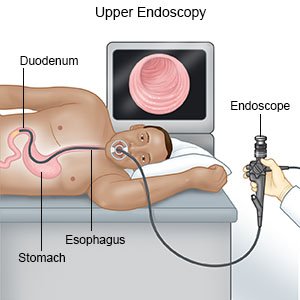Dysphagia
Medically reviewed by Drugs.com. Last updated on Aug 4, 2025.
What is dysphagia?
Dysphagia is trouble swallowing. You may have trouble moving food or liquid from your mouth to your esophagus or down to your stomach. You may have the problem when you eat, drink, or any time you try to swallow. Dysphagia can last a short time, or it can be a permanent problem.
 |
What increases my risk for dysphagia?
- Narrowing of your esophagus caused by acid reflux, an infection, or tumors
- Nerve or muscle problems that slow the movement of food
- Brain injury, or conditions that affect the nervous system such as stroke, dementia, or Parkinson disease
- Radiation therapy or head and neck surgery
- Certain medicines such as antihistamines, diuretics, antidepressants, and blood pressure or antinausea medicines
What other signs and symptoms may I have?
- Drooling, coughing after swallowing, or spitting up food
- Hoarse or wet-sounding voice while you eat or drink
- Feeling like food is stuck in your throat or pressure in your chest after you eat
- Lung infections that happen often
- Weight loss without trying
How is dysphagia diagnosed?
Your healthcare provider may ask if you only have trouble swallowing when you eat or drink, or any time you try to swallow. You may also need any of the following tests:
- A water swallow screening test will show how well you swallow thinner liquids, such as water. Thinner liquids can make you choke more easily than thicker liquids. This test may show signs of dysphagia and aspiration (movement of liquid into your lungs). It can be used to help healthcare providers decide if you need other tests.
- Other swallow tests may show which parts of your throat or esophagus are not working well. These tests may include x-rays of your throat and esophagus. You may be given a thick liquid called barium to help your esophagus show up better on x-rays. These tests may also show if the position of your head affects the way you swallow.
- Endoscopy is a procedure that may show narrowing or inflammation in your esophagus.

- Manometry measures the pressure within the esophagus and stomach.
- pH monitoring is used to check your throat for acid reflux.
How is dysphagia treated?
Treatment depends on the cause of your dysphagia. You may need medicine to reduce acid reflux or muscle spasms in your throat. You may also need any of the following:
- Nutrition changes may reduce choking problems. Your healthcare provider may show you how to thicken liquids or soften foods to make them easier to swallow.
- A therapist can teach you different ways of swallowing by changing your head and body positions. You may be taught exercises to strengthen the muscles that help you swallow.
- Surgery may be needed to widen your esophagus or treat other medical conditions that cause dysphagia. Surgery may also be used to place a feeding tube. Liquid nutrition and medicines can be put through the tube so you do not have to swallow them.
Call your local emergency number (911 in the US) if:
- You have chest pain.
- You have shortness of breath.
When should I seek immediate care?
- You choke on your saliva.
- You cannot eat or drink liquids at all.
When should I call my doctor?
- You lose weight without trying.
- Your signs and symptoms get worse, or you have new signs or symptoms.
- You have signs or symptoms of dehydration, such as increased thirst, dark yellow urine, or little or no urine.
- You get colds often.
- You have questions or concerns about your condition or care.
Care Agreement
You have the right to help plan your care. Learn about your health condition and how it may be treated. Discuss treatment options with your healthcare providers to decide what care you want to receive. You always have the right to refuse treatment. The above information is an educational aid only. It is not intended as medical advice for individual conditions or treatments. Talk to your doctor, nurse or pharmacist before following any medical regimen to see if it is safe and effective for you.© Copyright Merative 2025 Information is for End User's use only and may not be sold, redistributed or otherwise used for commercial purposes.
Learn more about Dysphagia
Treatment options
Care guides
Further information
Always consult your healthcare provider to ensure the information displayed on this page applies to your personal circumstances.
